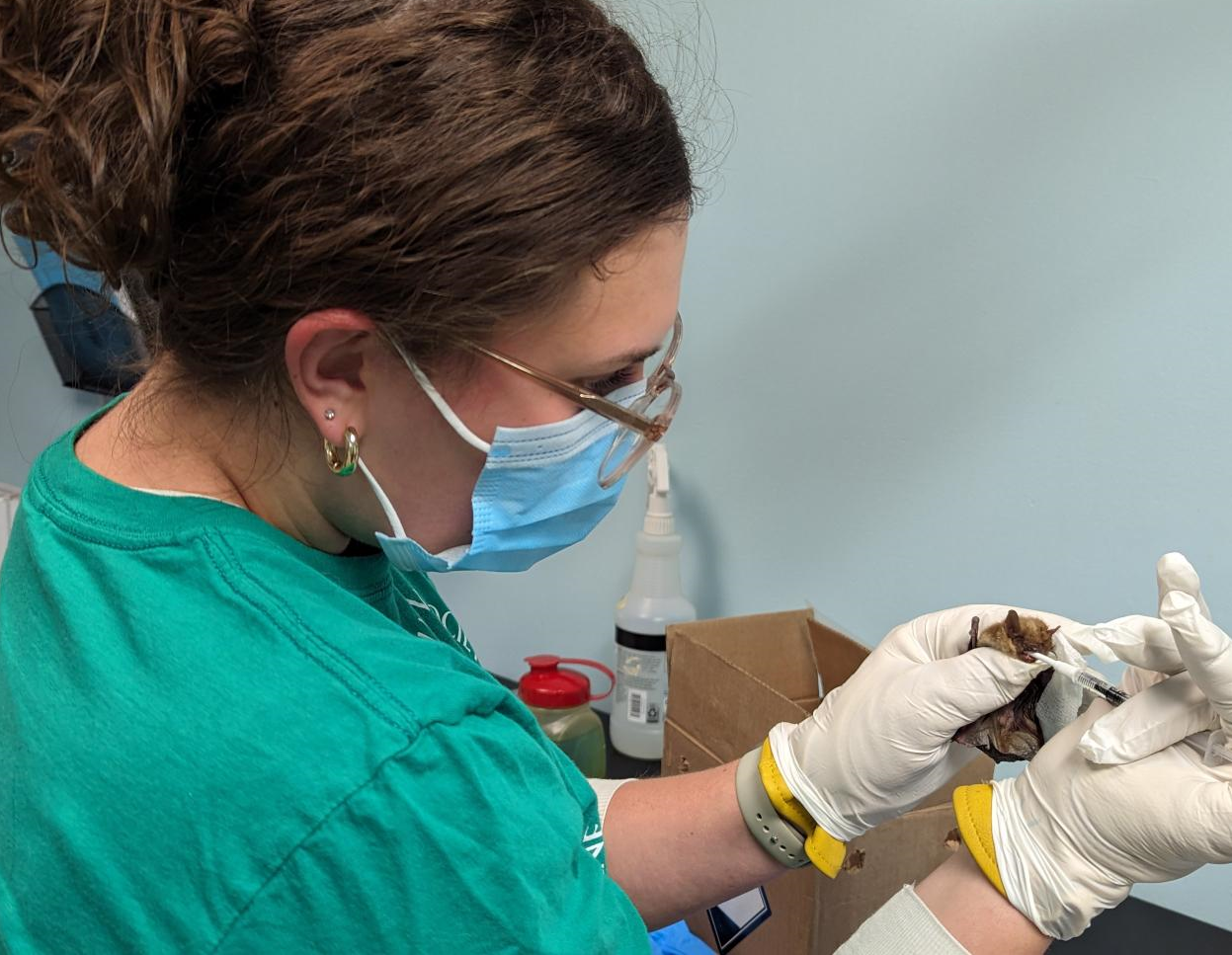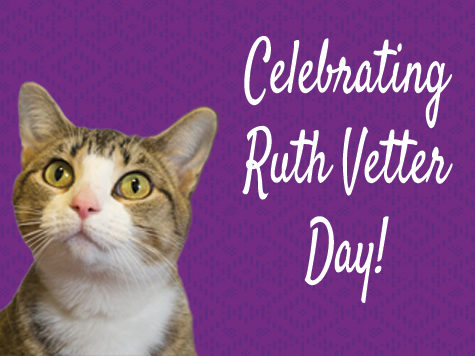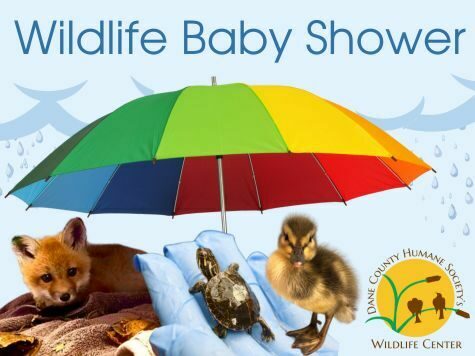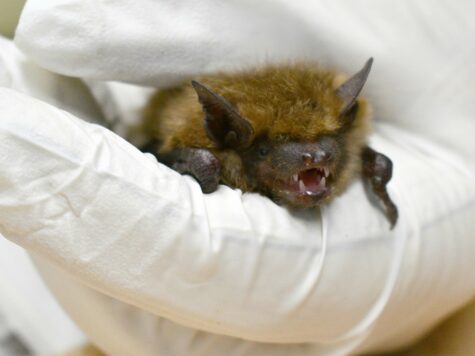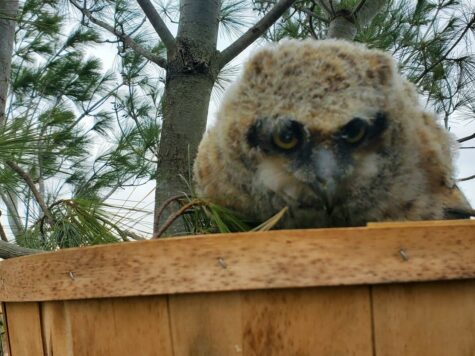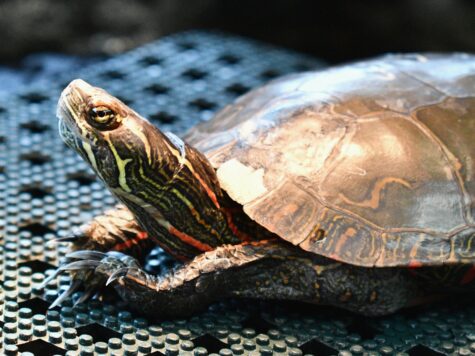“For as long as I can remember being in school I was taught about all the ways the human race is bad for the planet: global warming, pollution, deforestation, and the constant expansion of our population into previously wild spaces. Growing up in California, I saw firsthand the ways marine wildlife was being affected by human populations. Every walk by the bay was marred by the discovery of a decaying bird skeleton with a trash-filled stomach, or the body of a bloated eagle ray entangled in fishing wire. I struggled for a long time with the guilt of the countless animal lives lost every day and felt helpless. At one point in elementary school, we took a field trip to the Marine Mammal Center where they walked us through the different steps of wildlife rehabilitation, and I knew I had found my passion.
“When I started school at UW Madison, I was excited to be starting the first steps towards my career goal but felt disappointed to be living downtown where the presence of wildlife has negative implications for them. I heard about this wildlife internship through several mutual acquaintances who had done it in the past and just needed to wait until I had a semester with adequate time to devote.
“Throughout the past month at this internship I have already learned more than I ever did in a month of any courses I’ve previously taken. Obviously, being in an environment where our actions are more positive than negative for wildlife is exciting. However, I am discovering that the medical side of wildlife rehabilitation is fascinating and Monday vet days have turned into the day of the week I look forward to most. As I continue this internship, I am hoping to learn more about the medical decisions behind rehabilitation, why they are made compared to other alternatives, specific benefits of one medication over the other, and how the decisions we make here affect their survival after release. With a month of experience and knowledge, I am so excited to continue learning and taking bigger steps towards the career I’ve been passionate about for so long.”
– Mikah Fitzpatrick
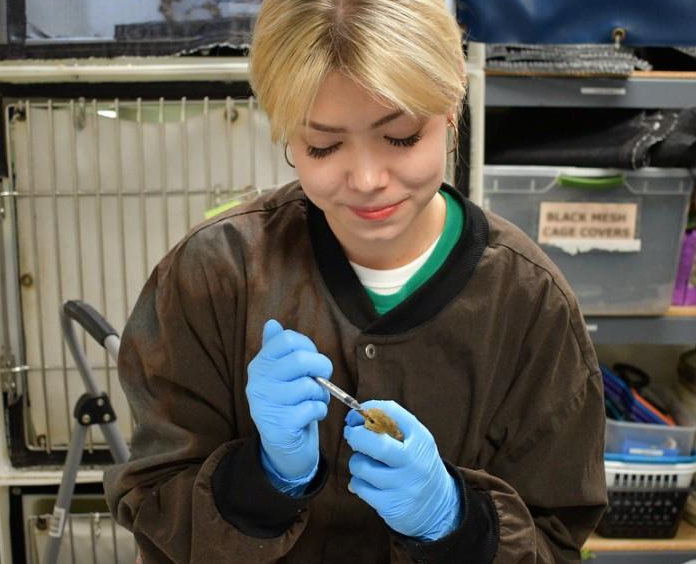
“I’m currently in my second year of college, but only in my second semester studying wildlife ecology. When I went to college I thought I wanted to study art history and took classes such as Greek sculpture in my first year. Last summer I didn’t have enough experience to get an internship in the art field, so I decided to find a different job. I was always fascinated by animals and grew up with many pets. I grew up never having less than three animals in the house, and my family currently has five dogs. For several years, my family and I have observed the wildlife in our backyard for fun. We loved to see the many kinds of birds at our feeders, as well as the mammals such as raccoons, squirrels, chipmunks, and occasional deer that would regularly stop by.
“My love of wildlife brought me to Anderson Humane in South Elgin, Illinois where I started volunteering in their wildlife nursery. I began working in June when the nursery was maxed-out with all kinds of baby mammals and birds. I could tell they needed an extra hand, as I was quickly shown how to syringe feed a baby bird and sent off on my own to feed as many babies as I could during my four-hour shift. When I went home and my parents asked how my first shift went, I replied, “It was fun, but I don’t think I’d want to do that every day!” Flash forward a few weeks later and all I wanted to do was be in the wildlife nursery. Shortly after realizing my love of working with wildlife strongly outweighed my love of art history, I emailed my college advisor and switched majors. When I had to leave Anderson Humane and head back to school, I was sad and wanted to find somewhere to go to continue to work with animals during the school year. When I learned about the wildlife rehabilitation internship at DCHS, I knew I had to apply.
“I’m extremely excited to get started as an intern, and I’m hoping to work with animals that I haven’t had the opportunity to work with before. I’m especially eager to work with raptors, as I have always found them to be beautiful, but intimidating and complex. I also look forward to the new responsibilities I will have as an intern. I’m interested in learning more about the medical side of rehabilitation, where as a volunteer I spent more time fixing enclosures and preparing diets. I’m very grateful to have been given the opportunity to continue learning about wildlife rehabilitation with DCHS!”
– Julia Madary
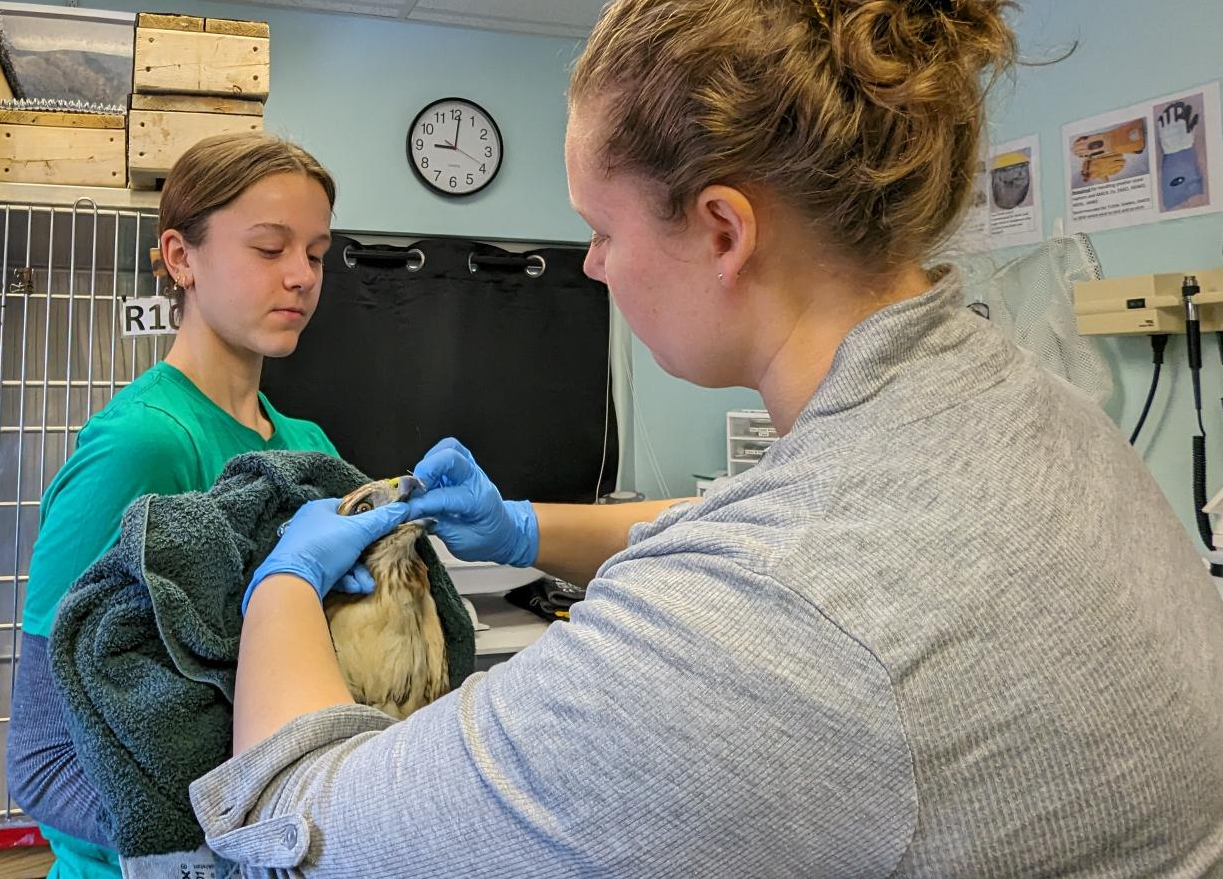
“I have an educational background in genetics and environmental sciences, which helped me find a passion for working in conservation. I’ve also always had a love for animals. After debating career options, I realized that I want to work toward the improvement of animal and environmental health. The opportunity to work with and learn from extremely experienced wildlife educators is a rare one, so once I learned about the DCHS internship, I knew I had to go for it. I’m hoping to learn more about Wisconsin wildlife, and the dynamic between the community and the wildlife rehabilitation team.
“Just a month into my internship, I have already seen and learned so much about this field. The center was rehabilitating a goose who suffered lead poisoning. I got to see the care of this animal and the progression of his ailments. After weeks of trying to bring down his lead levels and improve his physical condition, his neurological symptoms remained. Ultimately, the team made the decision to euthanize this patient. I helped with this patient’s necropsy, and we discovered that he had a ruptured GI tract. This is something we could not have repaired. This was special to me because it validated the teams’ efforts and the difficult decisions we are faced with in the field.
“I have gotten to learn a little about Wisconsin wildlife already—what problems they face, the interactions they have with humans, and how we can help them. Coming into this experience, I probably couldn’t have made a list of Wisconsin songbirds longer than a few, but now my list has doubled in size. I’ve learned much about dietary, housing, and social needs, as well as how to properly handle some species. Most importantly, I have learned and witnessed that this work is extremely important. It has long hours and can be emotionally taxing. Yet, each morning I arrive at the center, I am greeted with smiles and high energy. Seeing the positivity that each team member brings daily is deeply inspiring and has motivated me to continue to explore my passion for improving the lives of animals and working in conservation.”
– Megan Moskal
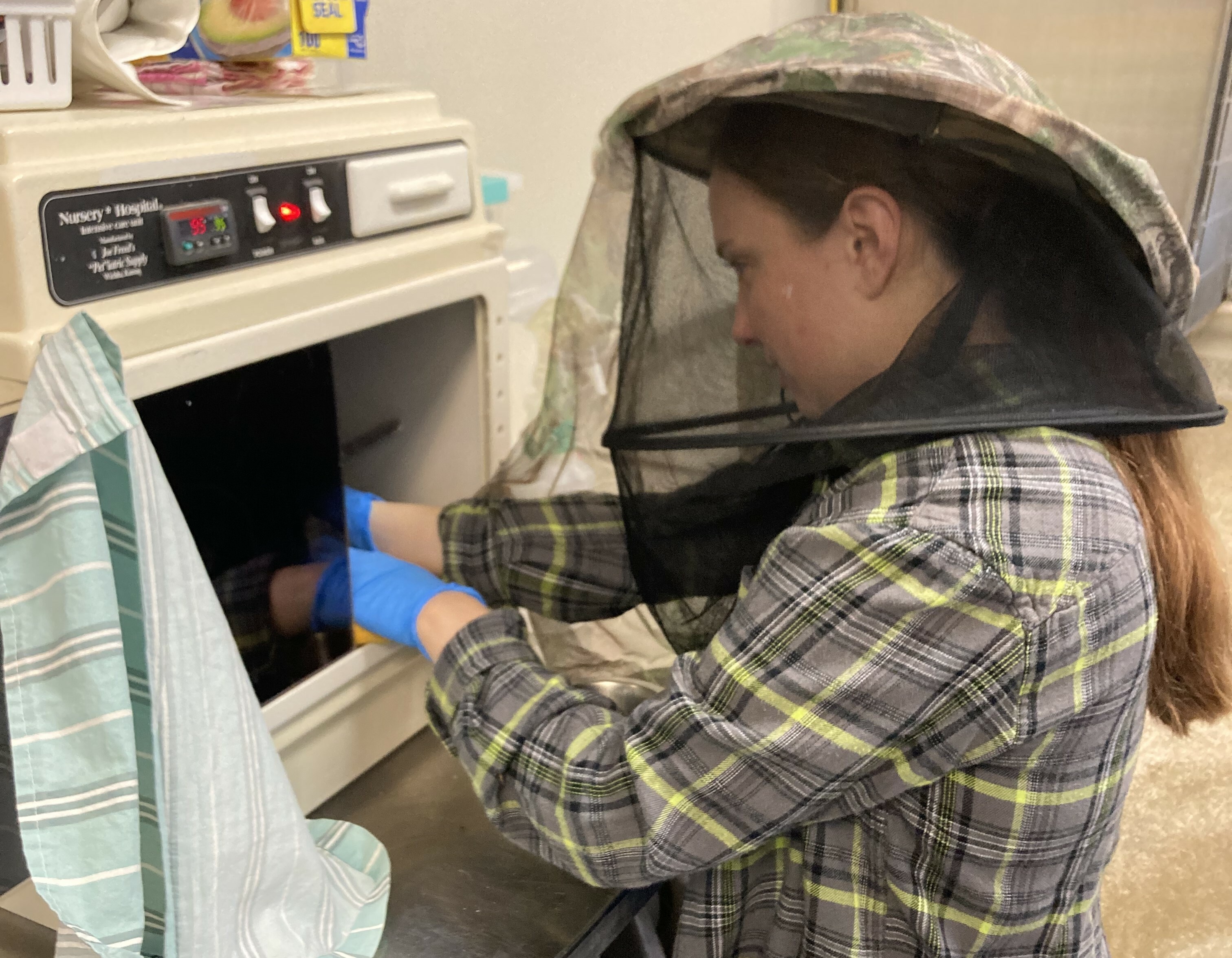
“As I am nearing the end of my undergraduate career, the past year or so I have been deeply thinking about what I want to do post-college. I am unfortunately still trying to figure out what that passion and drive factor is for me in life. I just feel like I have not had that “ah-ha” moment in my life yet, which is something I’m yearning for. With that being said, I have been trying out new internships and jobs that may inspire me to be passionate enough to make it my career.
“My twin sister completed this internship in the summer of 2021 and absolutely loved it. It was validation for her that she is supposed to do wildlife rehabilitation as her career in life. Seeing her passion about rehabbing wildlife made me think about if I could fall in love with something like it as well. Therefore, I thought it would be a great idea for me to expand my knowledge and experience to doing something that may be out of the ordinary for me or a little outside of my comfort zone. I was inspired by my twin sister and her passion for helping wildlife to apply for this internship, as well as my desire to find a passion and turn it into a career.
“I really wanted to learn how to handle wildlife and how to take good care of various species. I already have learned so much at the Wildlife Center on proper holding techniques, what to feed certain species, how to make them feel more comfortable and feel like they are in their natural habitats, and so much more. I would like to observe and learn more about the medical aspects, like doing check-ups on patients and giving medical care. I would overall love to learn how to properly take care of all different kinds of species, like raptors, reptiles, amphibians, waterfowl, songbirds, etc. Lastly, I am looking forward to learning how the center runs on a day-to-day basis and what crucial activities may go on behind-the-scenes for the Wildlife Center to fully function and thrive.”
– Lauren Stielow
